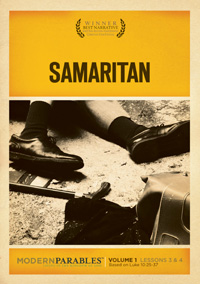 As I said in my last post, I started using the Modern Parables series for my Sunday School class. I continue to be impressed with these videos. These last two weeks I presented Samaritan, both the parable film and the application video.
As I said in my last post, I started using the Modern Parables series for my Sunday School class. I continue to be impressed with these videos. These last two weeks I presented Samaritan, both the parable film and the application video.
This film is based on the famous parable of the Good Samaritan found in Luke 10.
Samaritan is set in the modern context of a big city. The film opens with an old man laying in an alleyway, heavily beaten. He crawls his way to the street and rests against the side of a building, obviously traumatized. Two men have the opportunity to help: a deacon (who also happens to be a doctor) and a youth minister. But the one who ends up coming to his aid is an Arab taxi driver.
What I Loved
- The style of the film matched the feel of the parable. There’s a certain gravity to the story of the Good Samaritan, and this film captured an appropriately anguished mood. The film style was inspired by the influential Swedish filmmaker Ingmar Bergman (from such films as Cries and Whispers). The film’s score was done with a string quartet, inspired by Bach’s cello suites. You couldn’t help but feel a certain level of compassion in your gut watching the story.
- Casting an Arab man as the Samaritan was brilliant. In our post-911 world, probably few groups are regarded with as much suspicion as Arabs. And while the film does not indicate his religion, the parallels between Jew-Samaritan relations and Christian-Muslim relations provide a fitting modern counterpart to the original parable.
- Casting a deacon/physician as the “priest” was very fitting. The deacon is portrayed as an overly cautious and scrupulous man who is more concerned about his son putting iodine in his drinking water and making sure his car seats don’t get scratched than the bleeding man on the side of the road, whom he completely overlooks. Much like some of the priests in Jesus’ day, the deacon has a great attention to detail, but miss the weightier matters of love, justice, and mercy.
What I Added
- I elaborated more on the compassion of Christ. I felt one of the crucial element in the parable was the Samaritan’s feeling of deep pity for the man on the road. The application video talks about our compassion being born out of experiencing the compassion of Christ. I presented to the group some of the instances this Greek word (splagchizomai) appears in the Gospels as food for thought (Matthew 9:36; 14:14; 20:34; Mark 1:41; 6:34; Luke 7:13).
- I led the class in a discussion of Colossians 3:1-17. Paul tells Colossae to “put on” compassion. I talked to the class about the importance of our obedience (v.5-17) flowing from an understanding of who we are in Christ and our hope in God (v.1-4).
Buy the DVD
You can purchase this DVD at the Compass Classrom store.










[…] Samaritan […]